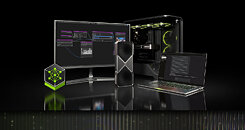
Lossless Scaling's Frame Generation Lands on Linux, Works on Steam Deck
The popular third-party upscaling tool, Lossless Scaling, previously exclusive to Windows, has been ported to Linux with the release of the open-source lsfg-vk project. Developed by PancakeTAS, lsfg-vk utilizes Vulkan and the DXVK translation layer to bring the frame generation feature of the paid Windows application to Linux desktops and handheld devices, such as the Steam Deck. Until now, Linux gamers relied on FidelityFX Super Resolution frame generation only in titles where it was natively available. The lsfg‑vk promises to extend artificial intermediate frames to nearly any game. Rather than depend on in‑game integration, lsfg‑vk intercepts DirectX 11 calls and reimplements the Lossless Scaling pipeline on top of Vulkan.
Rather than directly porting DX11 to Vulkan, the developer used DXVK to present a DX11 interface on Linux and hooked every shader load, allowing a bit-for-bit comparison between the original DXBC shaders and their SPIR-V counterparts. With shader fidelity verified, a combination of IDA‑based static analysis, custom C++ utilities to log DX11 commands, and careful file‑by‑file comparisons in WinMerge enabled reconstruction of the entire rendering pipeline on Linux. Finally, RenderDoc traces of Vulkan calls guided the implementation of a native Vulkan pipeline, complete with the required synchronization primitives. Additionally, automation scripts and a statically linked subset of DXVK allow users to install the project and enable frame generation simply by setting a single environment variable.
Rather than directly porting DX11 to Vulkan, the developer used DXVK to present a DX11 interface on Linux and hooked every shader load, allowing a bit-for-bit comparison between the original DXBC shaders and their SPIR-V counterparts. With shader fidelity verified, a combination of IDA‑based static analysis, custom C++ utilities to log DX11 commands, and careful file‑by‑file comparisons in WinMerge enabled reconstruction of the entire rendering pipeline on Linux. Finally, RenderDoc traces of Vulkan calls guided the implementation of a native Vulkan pipeline, complete with the required synchronization primitives. Additionally, automation scripts and a statically linked subset of DXVK allow users to install the project and enable frame generation simply by setting a single environment variable.






























































